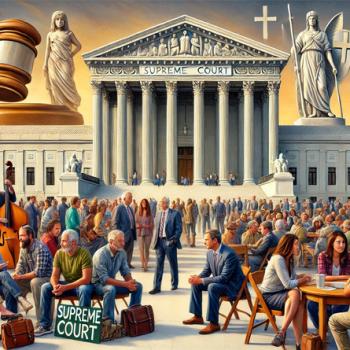Tribulation Force, pp. 177-188
Poor Buck Williams has had a long day. He caught an early flight to New York, traveling first-class under the name "McGillicuddy," had a long lunch with a Nobel laureate, and then spent the afternoon in a one-on-one session with the first Horseman of the Apocalypse before catching a flight back to Chicago in time for Bible study. Even that turned out strange as after only a brief dip into Revelation/Daniel/Ezekiel the subject turned to sex and morality and all of that, leading to Chloe's abrupt departure and the meeting ending "awkwardly."
But Buck's very long day isn't over yet:
Buck arrived home frustrated. … He didn't even know what was wrong. He changed out of his traveling clothes and into hiking boots, khakis, denim shirt and leather jacket. He phoned the Steeles.
Taking a moment to ponder what sort of "traveling clothes" might be comfortable for the plane ride, yet still appropriate for both an informal Bible study and a life-and-death encounter with the leader of the totalitarian One World Government. We're not told, although of course the outfit Buck changes into for his next telephone call is described in detail.
Rayford answered but after a few minutes came back to the phone to say that Chloe was unavailable. Buck was only guessing, but it sounded as if Rayford was as frustrated with her as he was.
"Rayford, is she standing right there?"
"That's correct."
"Do you have any idea what her problem is?"
"Not totally."
Rayford continues his clever deception for nearly a full page, with Buck asking if he can come over to the Steeles' house to talk to Chloe in person and Rayford carefully answering in such a way that Chloe won't know what they're saying. All she hears is a page of dialogue in which her father says things like, "I concur with that," "Affirmative," and "OK, Buck. Talk to you then."
Rayford didn't like deceiving Chloe. It was almost like lying. But he had enjoyed the coded banter with Buck.
Chloe's anger at Buck reminds Rayford of an argument he'd had with Irene back when they were dating and the advice his mother gave him at the time:
"You go to her right now, find her, and put the ball in her court. She can walk away from you once, but if she sends you away when you're coming after her, then you'll know she's serious. She may not know her own mind, but down deep, if I know women, I know she'd rather you pursue her than let her run."
Women are all silly like that, not knowing their own minds and getting all upset, making mountains out of molehills just because they've found out you're engaged to someone else. That's why they need to be pursued — stalked, even. That restraining order is really just a way of saying "come closer."
Rayford muses on this a bit more, leading to this paragraph, which offers several different kinds of creepy:
He had no idea what this other woman in Buck's life was all about, but he was sure that if Buck forced the issue, Chloe would confront him about her and find out. If Buck was living with someone, that was a problem for Rayford and Bruce as well as for Chloe. But Chloe's evidence seemed thin at best.
This "thin" evidence, as far as Rayford knows, consists of his daughter having driven to Buck's condo, where she met a woman who was moving in and who seemed to identify herself as his fianceé. We readers may know that this is Not What It Looks Like, but Rayford has no reason to suspect that.
All Rayford knows is what Chloe knows, but he discounts her eyewitness testimony as "thin at best." Why? Why is he instinctively siding with Buck and even conspiring with him against Chloe when he has no basis for doing so? Why should the same evidence that seems appropriately compelling to Chloe not be just as compelling to her own father?
Down deep, if I know the authors, it's because Chloe is a girl and Buck isn't. Faced with a he-said/she-said situation, Rayford and the authors always side with whatever he said.
There's a hint here, too, that Rayford suspects Buck may be sowing his wild oats. He worries that he and Bruce might have to have a talk with their young friend, but doesn't seem to regard this as a serious problem. Boys will be boys but, like that "necking session" Rayford had at the Pan-Con Christmas party back when Irene was pregnant with Raymie, it doesn't really mean anything.
So Rayford decides to help Buck out by tricking Chloe into "forcing the issue." This is his first impulse as a dad — to arrange for his daughter to go for a late-night walk alone with this guy who's engaged to someone else. I wonder if Rayford thinks this is what Hattie Durham's father ought to have done about him.
Rayford starts stalling, trying to keep Chloe up and about until Buck arrives by awkwardly suggesting that she stay up "to help me tidy up the kitchen." Jerry Jenkins, I think, wants this clumsiness to come across as endearing — stretching it out over several pages. But since Rayford's feeble efforts here are based on his trusting Buck for no good reason while also distrusting his own daughter for no good reason, it still just comes across as creepy.
Jenkins does a better job portraying Chloe's confused impatience with her father's odd behavior:
Rayford couldn't delay her any longer. "I'll be right down here in the living room with the TV on, OK?"
She gave him a funny look and matched his tone. "And I'll be right up in my room at the top of the stairs with my light off, OK?"
He nodded.
She shook her head. "Now that we have both reported in and we know where the other will be and what we'll be doing, am I excused?"
That's one of the few places in these books where human-seeming affection is portrayed — recognizing that one way we humans often express that affection is by yanking one another's chain. In the midst of this larger, disastrously failing scene, that one short exchange works.
Rayford waited until Chloe started up the stairs to turn on the front porch light. Buck knew the address and the general area, but he had not been there before.
The news was ending and only talk shows coming on, but Rayford didn't care. He was sitting there only as a diversion anyway.
OK, so it's 11:30 or, I guess, 10:30 central — late-night talk-show time. Rayford, I'm guessing, is more of a Leno guy than a Letterman fan (definitely not Colbert). What do you suppose Jay Leno's monologue would be like just weeks after the Event?
"So Angelina Jolie is having a tough month — not only did her six kids disappear, but then Brad Pitt gets replaced as People's Sexiest Man Alive. … [uncomfortable silence] … She's got a solution, though, she's gonna adopt Nicolae Carpathia. … Adopt him, Kevin, she's going to adopt … [murmurings of disapproval] … What? … Too soon?"
Buck's car pulls up in the driveway and Rayford springs into action like it's a surprise party for his daughter:
He hurried to the door and intercepted Buck before he rang the bell. "I'm going upstairs to bed," he whispered. "Give me a second and then ring the bell. I'll be in the shower, and she'll have to answer it."
This clever ruse works just as Rayford plans and Jenkins switches
back to Buck's point of view:
This was a great idea!
Buck thought …
The italics, the exclamation point and the vapid enthusiasm are all there in the original.
This was a great idea! Buck thought, impressed that Rayford Steele trusted him enough to let him talk to his daughter when she obviously had something against him.
At that moment, when Buck still has no idea why Chloe seems upset, this trust might indeed seem impressive. At this point, to Buck, it probably seems like Rayford already knows that Chloe's hostility is All A Big Misunderstanding. But later Buck will learn that this isn't the case. He'll learn of the basis for Chloe's confusion and he'll realize that Rayford had no good reason not to accept Chloe's position as wholly appropriate. At that point Buck will have to see that Rayford's impressive-seeming trust of him was really more of a distressingly enthusiastic distrust of his daughter.
That ought to freak Buck out a little bit. What kind of dad, after all, acts on the presumption that his daughter is either lying or crazy? Either Chloe must have a history of unprovoked hostile delusions or else her father has a habit of treating her like she does. Either way, you'd think it might give Buck pause about getting more closely involved with this family.
It never does though.
Chloe heads down the stairs to see who's ringing the doorbell at 10:30 at night. She's come a long way from the traumatized girl who, just two weeks ago — after Jimmy Bats had broken into the house and stolen the TV and all of Raymie's toys — was too terrified to stay home alone.
She sees Buck on the porch and, without opening the door, tells him to go home.
"I'm not leaving till you talk to me," he says.
Chloe called his bluff. The porch light went out, and he heard her trotting up the stairs.
Here we enter the realm of farce. Buck sits down on the porch, stubbornly vowing to be "on her stoop in the morning when she got up, if that's what it took." Chloe tip-toes around, sneaking peeks to see if he's still there. Rayford creeps around upstairs, trying to eavesdrop on both of them.
Farce is a tricky business, though. When it works, it's like a symphony with the layering on of recurring jokes building to a crescendo. And like in a symphony, tempo and pacing are crucial. The composer and conductor of this particular symphony is Jerry Jenkins, so take a guess how that works out.
Yeah. About like that.
The initial ingredients here were actually somewhat promising. You've got three people, all partially misinformed and misguided. And one of them is already in a bathrobe. But the scene continues for several pages without the pace quickening and without adding any new notes. By the end of this scene, we should have wound up with Rayford, Bruce Barnes, Spiky Alice and Woeful Loretta, plus maybe Steve Plank, Earl Halliday and a pizza delivery guy, all crowded in the Steele's kitchen. (And then I'd send in four ship's stewards from the S.S. Americus.)
Instead, after Chloe trots up the stairs, she creeps back down the stairs, then back up and … well, it just sort of goes on like that for a bit, with Buck's stubbornness outlasting the patience of the reader long before it outlasts Chloe's resistance.
"Get in here," she says after four uneventful pages. "You've got 10 minutes."
Having been granted just a short time to plead his case, Buck makes a strange decision on how to begin.
"I wanted to bring you flowers," he said. "Seeing as yours are in the trash."
And so we move from the realm of farce to the realm of self-parody.
Seriously, I winced when I read that. I couldn't believe either Buck or Jenkins was dumb enough to go back to that.
But then it was dumb of me to think that, too. Of course they both are. And Jenkins is determined to milk the flowers-in-the-trash bit for another three pages.
"Did you think I was kidding?" she said, pointing past him. He turned and looked. Sure enough, a huge bouquet of flowers was jammed in a wastebasket.
Their conversation for the next several paragraphs is stuck in a repetitive loop, so rather than follow it closely, allow me to point out that no matter what one thinks of the sender, the flowers do not belong in the trash.
If they came wrapped in plastic or tissue paper, then that wrapping may well belong in the "wastebasket," but the flowers themselves do not go in the trash. This is organic plant material, people. It belongs in the compost pile.
Granted, composting may not seem particularly urgent given that the world is going to end in roughly seven years, with all manner of divinely wrought environmental calamities occurring in the interim. But as Martin Luther said, "If I knew the world would end tomorrow, I would plant a tree."
Flowers don't go in the trash. There's no need for them to spend forever in a landfill even if forever turns out only to be another seven years or so.
Anyway, picking up on the next page:
"I said the flowers were in the trash, and that's what I meant. I mean what I say, Buck."
See? We didn't miss anything by skipping ahead there.
We get another half-page of back-and-forth during which Chloe says that she threw out the flowers because of "who they came from" and Buck acts bewildered, never quite directly asking her who they came from even though it seems impossible for him not to understand that she clearly thinks they came from him.
And then we get another half-page beyond that in which Buck finally figures out that she thinks he sent the flowers, but he decides condescendingly to let her continue accusing him just so he can savor her comeuppance when he let's her know she's wrong.
He does this despite the fact that she is "obviously fighting tears."
Because that's the kind of guy Buck is in this chapter. He doesn't care that Chloe is reduced to tears, only that he wins by proving to her that he is right and she is wrong.
"… if you think those flowers fixed anything –"
"Chloe! Let's talk about real problems! I had nothing to do with those flowers."
For once, Chloe was silent.
And that's where the chapter ends. The woman, "for once," is silent and the man again has the upper hand. Order is restored.
All we've actually sorted out so far is the flowers in the trash. The actual source of their confused disagreement will take another 15 or so more pages of repetitive, obtuse dialogue for them to sort through.
(How's that for an enticing teaser for our next entry?)
















